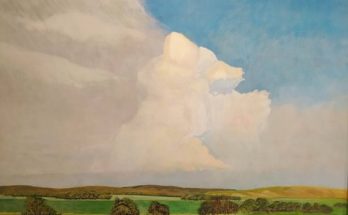(Random House, 1985)
By Clare Howell
This novel is a gut punch, an assault to one’s equilibrium. Once its parade of horrors is imprinted on the mind, there are some that cannot be forgotten. Yet “Blood Meridian” is essential reading to understand America’s fulfillment of manifest destiny. Its prose is sublime. Reading at times like scripture, its omniscient narrator is as pitiless as the Old Testament God. His grimness is unrelieved. The fire and brimstone hover always close to the elemental thirst, pain, avarice, death, continual death, whose avatar, Judge Holden, proclaims, “War is God.”
Yet this work is a companion piece to one of the most serene meditations on the beneficence of human character in American literature—“Death Comes for the Archbishop” by Willa Cather. Together they are crucial tales in America’s origin story. Both are based on historical characters; the stories are contemporaneous, playing out just after the U.S.-Mexican War (1846-48) in the similar terrain of deserts that were formerly part of Mexico. With no army, civilian law enforcement, electricity, postal service, railroad, or penicillin, their stories play out in stark contrast to each other. They’re opposite sides of the same coin.
“The Kid,” a teenager from Tennessee, the co-protagonist with Judge Holden of “Blood Meridian,” goes unnamed. He’s based on the writings of Sam Chamberlain, a young soldier who later rode with the Glanton gang. “The Kid” is prone to violence, easy to provoke, and craves open spaces. He finds his way to Texas and his first demented irregular captain, who rants to him about Mexicans, “What kind of people are these? The Apaches won’t even shoot them. They kill them with rocks… What we’re dealing with is a race of degenerates.” His head ends up in an Indian’s pickle jar.
“The Kid” escapes the demise of his first gang to join a more accomplished miscreant, John Joel Glanton (his real and fictional name), and his band of filibusters, who contract with the Mexican governor of Chihuahua to bring him Apache scalps for bounties. Picture the Americans: “Haggard and haunted and blackened by the sun. Even the horses looked alien, decked out as they were in human hair and teeth and skin.” Except for their weapons, “there was nothing about them to suggest even the discovery of the wheel.”
The action proceeds with Glanton’s gangsters roaming the desert back and forth across the border looking for Apaches. “They kill and scalp any Indians they come across—pastoralists, farmers, laborers, old and young, and Mexicans, as they raid a pueblo. Men were moving on foot among the huts with torches and dragging the victims out, slathered and dripping with blood, hacking at the dying and decapitating those who knelt for mercy.”
“They take their booty to Chihuahua to redeem, the scalps being strung about the iron fretwork of the gazebo like decorations. The severed heads had been raised on the poles above the lamp standards where they now contemplated with their caved and pagan eyes the dry hides of their kinsmen”
But the Indians give as good as they get, stripping the clothes from the dead and seizing them up by the hair and passing their blades about the skulls of the living and the dead alike and snatching aloft the bloody wigs and hacking and chopping at the naked bodies.”
Judge Holden is the immoral center of this story and one of the oddest characters in fiction. He is the embodiment of chaos. Nearly seven feet tall, “He shone like the moon so pale he was and not a hair to be seen anywhere upon that vast corpus, not upon his chest nor in his ears nor any tuft at all above his eyes nor to the lids thereof. He was a misanthrope, botanist, murderer, anthropologist, linguist, and pedophile. ‘The truth about the world,’ he said, is that anything is possible…’ It’s a hat trick in a medicine show, a fevered dream, unspeakable and calamitous beyond reckoning.”
“He declares Moral Law an invention of the weak. He’s not saying, ‘might makes right;’ he simply ignores morality: ‘Decisions of life or death, of what shall be and what shall not, beggar all lesser ones subsumed: moral, spiritual, natural.’ He says all of society is contained within War, which will endure, ‘because young men love it, and old men love it in them.’ Those that fought and those that did not.”
“A nation that loses its cultural memory often repeats its mistakes. As wisdom has it, ‘history doesn’t repeat itself, but it rhymes.’”




